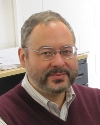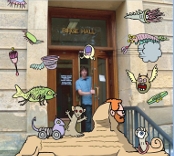NIMBioS Calendars: Events Seminars Live Streaming Visitors Working Groups Workshops Tutorials Other
2010 Archive: NIMBioS Seminars
 In conjunction with the interdisciplinary activities of the National Institute for Mathematical and Biological Synthesis (NIMBioS), a seminar series on topics in mathematical biology is hosted at NIMBioS every other Tuesday at 3:30 p.m. (unless otherwise noted) in Hallam Auditorium, Room 206, Claxton Building, 1122 Volunteer Blvd.
Seminar speakers focus on their research initiatives at the interface of mathematics and many areas of the life sciences. Light refreshments are served in the 1st floor visitor breakroom beginning 30 minutes before each talk. Faculty and students from across the UT community are welcome to join us.
In conjunction with the interdisciplinary activities of the National Institute for Mathematical and Biological Synthesis (NIMBioS), a seminar series on topics in mathematical biology is hosted at NIMBioS every other Tuesday at 3:30 p.m. (unless otherwise noted) in Hallam Auditorium, Room 206, Claxton Building, 1122 Volunteer Blvd.
Seminar speakers focus on their research initiatives at the interface of mathematics and many areas of the life sciences. Light refreshments are served in the 1st floor visitor breakroom beginning 30 minutes before each talk. Faculty and students from across the UT community are welcome to join us.
Video Archive of NIMBioS Seminars
Archived Seminar Calendars:
2020
2019
2018
2017
2016
2015
2014
2013
2012
2011
2010
2009
NIMBioS Seminar Abstracts
 Time/Date/Location: 3:30 p.m., Nov. 16, NIMBioS Lecture Hall, 1534 White Ave., Suite 400
Time/Date/Location: 3:30 p.m., Nov. 16, NIMBioS Lecture Hall, 1534 White Ave., Suite 400Speaker: Dr. Peter Turchin, Dept. of Ecology and Evolutionary Biology, Dept. of Mathematics, Univ. of Connecticut
Topic: The rise of complex human societies as a major evolutionary transition
Abstract: Multilevel selection is a powerful theoretical framework for addressing these questions. Turchin uses this framework to investigate a major transition in human social evolution, from small-scale egalitarian groups to large-scale hierarchical societies such as states and empires. A key mathematical result in multilevel selection, the Price equation, specifies the conditions concerning the structure of cultural variation and selective pressures that promote evolution of larger-scale societies. Specifically, large states should arise in regions where culturally very different people are in contact, and where interpolity competition - warfare - is particularly intense. Turchin explores the implications of this theoretical result with a spatially explicit agent-based model and tests model predictions with historical data. Click here for more information.
 Time/Date/Location: 3:30 p.m., Nov. 23, NIMBioS Lecture Hall, 1534 White Ave., Suite 400
Time/Date/Location: 3:30 p.m., Nov. 23, NIMBioS Lecture Hall, 1534 White Ave., Suite 400Speaker: Dr. Robert Gilman, NIMBioS Postdoctoral Fellow
Topic: Hybridization, species collapse, and other strange stories
Abstract: There are now a number of well-studied cases in which pairs of incipient species have collapsed into hybrid swarms. It has been hypothesized that such collapses may occur when an environmental disturbance weakens the pre-mating barriers to reproduction between species. Gilman uses individual-based models to investigate the conditions under which this mechanism might lead to species collapse and to predict the long-term evolutionary outcomes of such collapse events. Gilman will also address the mechanisms that underlie the forward process of adaptive speciation and will briefly discuss speciation probabilities when disruptive selection occurs in one or more than one ecological dimension. Click here for more information.
 Time/Date/Location: 3:30 p.m., Nov. 30, NIMBioS Lecture Hall, 1534 White Ave., Suite 400
Time/Date/Location: 3:30 p.m., Nov. 30, NIMBioS Lecture Hall, 1534 White Ave., Suite 400Speaker: Dr. Philip H. Crowley, Dept. of Biology, Univ. of Kentucky
Topic: Gaming the system: Adaptive decision making by plants and animals
Abstract: Under natural and sexual selection, organisms should approach optimal solutions to the problems that confront them, maximizing lifetime reproductive success (fitness). When genetically different organisms interact, there are often elements of both cooperation and conflict involved, and the protagonists are playing evolutionary games. When the individuals are genetically identical, conflict and its fitness costs evaporate and fitness maximization rises to the group level. Three case studies of diverse taxa making decisions about sex allocation and life history will be presented. The simultaneous-hermaphrodite chalk bass must allocate appropriately to male vs. female function while dealing with two interesting forms of sexual conflict. A small population of hermaphroditic plants must also solve the sex allocation problem, but something unexpected happens to the solution when this population is consistently pollen limited. And polyembryonic parasitoid wasps can produce very large clonal broods ideal for understanding how a balance is struck between the size of the brood and the mass of individual offspring -- the classic size-number trade-off. Progress in describing these three scenarios and plans for future work will be discussed. Click here for more information.
NIMBioS Interdisciplinary Seminars
NIMBioS is sponsoring seminars on a range of topics at the interface of mathematics and biology. Seminars are open to the public. Click on speaker's name for more information (as available). Anyone interested in meeting with the speakers should contact Dr. Chris Welsh. Meeting times and locations are subject to change, so please check this site prior to attending a seminar.
| Date | Speaker | Topic |
|
12 noon, Jan 21 A335 Vet. Teaching Hosp. | Dr. Cristina Lanzas | Transmission dynamics and control of enteric pathogens |
|
3:35 pm, Jan 21 102 Haslam Bus. Bldg. | Dr. Peter Kim | Role of regulatory T cells in producing a robust immune response and maintaining immunodominance |
|
12:15 pm, Jan 25 A335 Vet. Teaching Hosp. | Dr. Eunha Shim | Rabies in Tanzania: Mathematical modeling with epidemiological and economic considerations |
|
12:00 pm, Jan 26 1122 Volunteer Blvd., Suite 106 Rm 403 | Dr. Eunha Shim | Antiviral resistance during an influenza pandemic: optimal antiviral strategies driven by individual and population interest |
|
1:15 pm, Jan 28 Univ Cntr 223 | Dr. Xiao Wang | Programming gene regulation: From synthetic gene networks to cell differentiation |
|
10:00 am, Feb 4 510 Ferris Hall | Dr. Judy Day | Modeling the immune rheostat of macrophages in the lung in response to infection |
Other Talks of Interest at NIMBioS
| Date | Time | Speaker | Topic |
| March 30 | 3:30 pm | Dr. Jeremy Van Cleve, Santa Fe Institute | Evolution and epigenetics: genomic imprinting in mammals and stochastic switching in bacteria |
New Biophysics Seminar Series
A new biophysics seminar will be held in the spring semester 2010. Co-organized by Dr. Jaewook Joo, NIMBioS faculty in UT's Dept. Physics and Astronomy, and Alexei Sokolov, UT Dept. of Physics and Astronomy and Dept. of Chemistry, UT graduate students can claim one credit by attending more than 70% of the seminar.
NIMBioS
1122 Volunteer Blvd., Suite 106
University of Tennessee
Knoxville,
TN 37996-3410
PH: (865) 974-9334
FAX: (865) 974-9461
Contact NIMBioS


